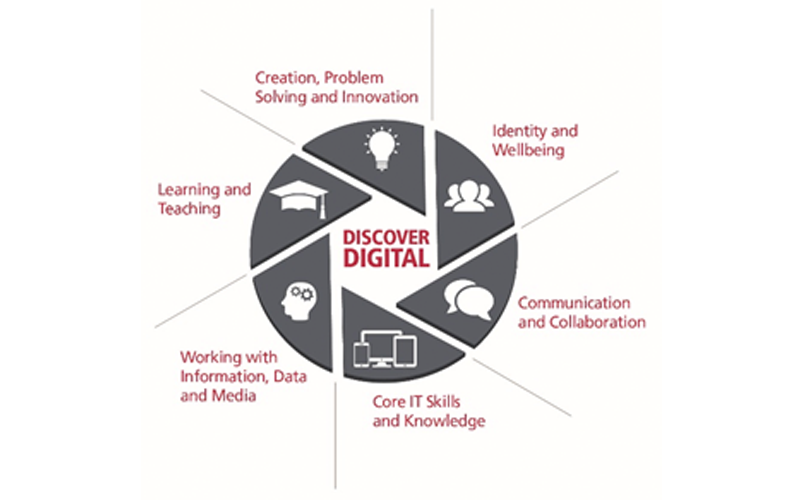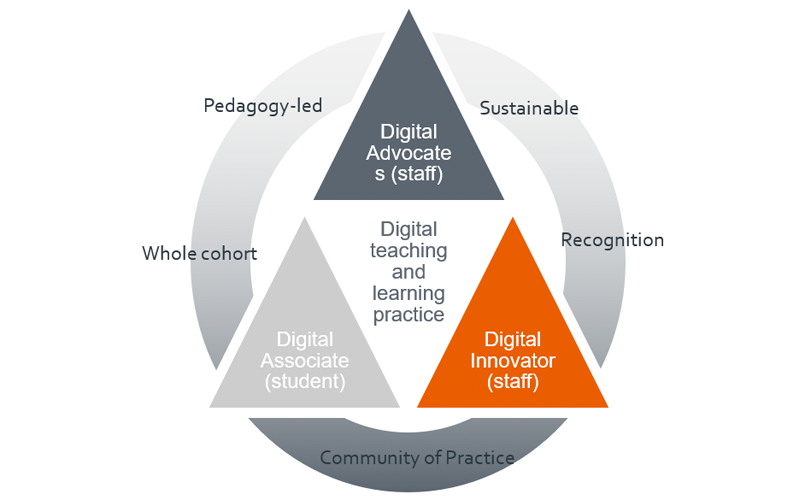University of Leicester

Strategy, vision and culture: digital at the heart of what we do
A digitally fluent institution is one that makes use of the tools and resources available to it, but it is also where a community of talented individuals are empowered and encouraged to innovate and design in new and different ways.
Dr Ross Parry, associate professor and deputy pro-vice-chancellor (digital), University of Leicester
Developing digital skills and capabilities are strategic priorities for the University of Leicester as it works towards the ambition of becoming a “discovery-led university” that is “ever more focused on innovation” (University of Leicester 2015 Strategic Plan). The role of digital technologies in achieving this vision is articulated in greater detail in the university’s digital strategy: Discovery-Enabling Digital 2016-2020 digital is at the core of how the university operates and the journey towards achieving its teaching, learning and research ambitions.
The university is taking a whole-organisation view of what this will involve (teaching and research, students and staff, academic and professional services) and is working on several co-ordinated and interlinked strands that contribute to the overall implementation plan. These include:
- Developing the digital skills and capabilities of students and staff
- Establishing governance structures that will build a forward-looking culture and facilitate collaboration across the university
- Enhancing digital leadership skills
- Engaging in digital activities across disciplines and in national and international digital communities of practice
- Communicating to stakeholders the vision and progress towards digital fluency
Communicating the concept of the ‘digital campus’
The concept of building a digital campus is part of the communication campaign that supports the Discovery-Enabling Digital 2016-2020 strategy. The ‘Digital Campus’ is the university’s way of seeing itself as a digital platform, but it is also the visual metaphor to organise and track its multiple projects and priorities.
This animated presentation describes the work across six strategic areas, and how each relies upon systems, data, objects and people-based aspects. It is an easily accessible and visual outline of the tasks and progress being made across the organisation.
Leadership and governance
We are very open and honest about the beginners’ mindset that we are taking to this whole challenge, seeing this as a learning opportunity for our organisation as we continue to share and reflect upon the complexity of designing and delivering institution-wide digital transformation.
Dr Ross Parry, associate professor and deputy pro-vice-chancellor (digital), University of Leicester
Senior leadership support for such a large-scale digital initiative is vital and the university has recognised this by appointing a Deputy Pro-Vice-Chancellor to lead the work on the digital campus.
New steering groups have brought key stakeholders together. To take one example, previously the university had several groups addressing different elements of digital skills support, all with slightly different approaches and emphases. The Digital Campus initiative has now brought these different services together, enabling them to work collectively around digital skills, avoiding a duplication of effort, maximising resources and communicating with a common language.
Three senior managers attended Jisc’s Digital Leaders Programme and have since integrated digital training within the university’s internal leadership programme, encouraging reflection on digital aspects of management and leadership as well as looking at how various digital tools can be introduced.
As well as the various initiatives, dedicated pages on the university website keeps stakeholders informed of strategic priorities, progress made and helps to maintain momentum. Discussion channels created through structure and governance steering groups build engagement and facilitate collaboration. Initiatives like the student-staff Digital Innovation Partnerships (DIP) include dissemination activities such as a Digital Takeover Day planned for July 2018.
Infrastructure: building the digital learning environment
Ease of access to essential organisational and communication systems
Investment in the digital infrastructure to support digital enablement includes improving organisational efficiency by introducing Microsoft Windows 10 and rolling out Microsoft Office 365 across the university with enhanced communication using tools such as Yammer and Skype for Business. Sharepoint has been used to develop ‘MyWorkspace’, a new staff intranet. These new tools and new ways of working will be introduced to staff through a series of roadshows to promote adoption and engagement. Early adopters will act as champions to support and encourage other staff. As Office 365 is rolled out fully, staff and students can begin to work in more collaborative, dynamic and productive ways.
A personalised end-to-end digital experience for students
For students, the ambition is to develop a personalised end-to-end digital experience that is closely linked to the university’s teaching and learning strategy. The aim is to provide a high degree of flexibility and personalisation across the various platforms: the external website; intranet; student portal; and the mobile app. Consistency will be aided by providing module templates within the VLE to be rolled out during the summer of 2018.
Our digital reading room – connecting people with technology
The new ‘Digital Reading Room’ is a physical manifestation of what the university is trying to achieve with the digital campus - connecting people with technology to build a more digitally fluent organisation. Located within the university library, the digital reading room provides a flexible social learning space where students and staff can create, discover, share and collaborate with friends and colleagues. The digital reading room is equipped with high-end interactive technology including an interactive wall, a large touchscreen table, group study spaces, and the means for users to plug in and drive this media using personal devices.
People are our priority
For the digital campus to grow and flourish you need to feel valued and able to develop your skills to make the best use of the technology and affordances that digital transformation will bring.
Nevin Moledina, digital skills and capabilities programme manager, University of Leicester
Developing digital skills, capability and culture
To support the digital strategy and work on the digital campus, the Digital Skills and Capabilities (DSC) steering group has been established bringing together colleagues from human resources, IT services, careers service, the doctoral college, library and academic practice. The steering group oversees and directs an integral programme designed to support individuals, teams and the institution to make the best use of current and future technology to transform working practices, operating models and develop a digital culture, specifically overseeing the following projects:
The digital literacy framework: A customised Digital Literacy Framework for the University of Leicester was agreed by the DSC steering group and formally endorsed by the University Leadership Team in November 2017. This provides a consistent framework through which digital training and skills development across the university will be co-ordinated. Adapted from Jisc’s digital capabilities framework (individual) , the Leicester adaptation also comprises six elements but offers a nuanced framework more suited to the university’s needs. Through the DSC steering group, the digital literacy framework will continue to be developed and embedded in university activities.

Digital skills are one of the academic literacies that students and staff need to develop. The Jisc framework was helpful in stretching our understanding, in particular, in relation to digital identity and wellbeing.
Dr Frances Deepwell, Director of Leicester Learning Institute, University of Leicester
The university is also taking part in the national pilot of Jisc’s Digital Discovery Tool which has been designed to support individual staff and students working in universities, colleges and training providers to reflect on their digital capabilities. Following a series of reflective questions, users receive a visual profile of their self-assessed capabilities with feedback and suggested actions and resources designed to help staff and students progress. Find out more via the Jisc Building Digital Capability project page and project blog
Digital innovation partnerships: Led by the Leicester Learning Institute, the DIPs provide an opportunity for staff and students to develop digitally enhanced learning and teaching. The overall aim of the DIP initiative is to support the development of digital literacies within learning and teaching.

Each DIP project comprises a three-way partnership of:
- A digital associate – a student who has confidence and experience in a range of digital tools and approaches
- A digital innovator – a member of staff who wishes to improve their digital knowledge and skills
- A digital advocate – a more digitally experienced member of staff who provides insightful advice to support implementation
Key principles are that the projects must be sustainable and have a wider impact beyond the initial projects. Students receive recognition through the Higher Education Achievement Report (HEAR) and via a Digital Associate open badge. They also receive a financial bursary. Staff involved in DIP projects can use this as evidence of professional development and for Higher Education Academy fellowships or senior fellowships. The DIP initiative is supported by a Digital Strategy intern.
Digital leadership development: Building leadership capability to support change is crucial to the university’s digital transformation. Working with the Organisational Development team, three initiatives are underway to build digital leadership capability:
The VITAL Leaders Programme – a one-day course (‘Leadership in a Digital Age’) embedded in the VITAL Leaders Programme, will support line managers (Grades 6, 7 and 8) by providing take away tools and techniques to use with their teams to:
- Consider how the digital strategy aims to change the way the university operates
- Identify the leadership attributes that support digital transformation in Higher Education
- Manage and influence digitally-driven change and organisational culture change
- Develop their own and their team’s digital confidence
Comments from participants reveal the impact of the training:
It’s not just about IT – it is about people, culture.
Participant on VITAL Leaders Programme
Understanding that systems and technology are driven by people, therefore it is the people that need to influence wider engagement in digital development and change in culture.
Participant on VITAL Leaders Programme
Build your own knowledge and confidence in order to be able to lead others in it – make time to make it a priority.
Participant on VITAL Leaders Programme
The Future Leaders Programme – a half-day session embedded in the Future Leaders Programme. ‘Leading Digital Change’ supports those on Grades 9, 10 and Heads of Division to:
- Explore what it means to lead a digital organisation
- Reflect on the digital transformat ion and the new leadership challenges and strategic opportunities this creates
- Identify the leadership attributes that support digital transformation to manage and influence digitally-driven change and organisational culture change
Again, reflections from participants reveal the insights gained from the training:
It was interesting to get a feel for the complexity involved in managing the strategy itself, its interaction with other strategies, the timescales and the funding commitments involved.
Participant in Future Leaders Programme
As part of leadership development in digital, the university is building a community of approximately thirty Digital Advocates drawn from the teaching, research and leadership areas of the university. Digital advocates will champion digital transformation and support implementation. They will motivate and mentor digital change initiatives such as the Digital Innovation Partnerships, role model digital collaboration behaviours or lead digital innovation within their own disciplines.
Digital credentials: The University now also acknowledges digital development using open badges. Digital Credentials are being offered to staff and students who have engaged with training and development within the university for activities such as volunteering, coaching and mentoring.
Embedding digital capabilities development in wider human resource functions: The steering group is exploring the relationship and synergy between its digital strategy and people strategy and identifying the role digital plays within recruitment, on-boarding for new staff, and professional development processes.
Engaging beyond the institution
The university is cultivating an outward-looking culture, participating in national initiatives such as the piloting of Jisc’s Digital Discovery Tool and Jisc Digital Capabilities Community of Practice, presenting at Digifest in March 2018 and hosting the May 2018 network event.
As a new member of the international Digital Nations Group (part of the Digital Workplace Group initiative) the university has taken on the role of ‘European Lead on the Digital Campus’ for the international collaborative partnership. Digital Nations Group accelerates the digital transformation of nations, to create a digitally integrated public and civic sphere globally, addressing the complex challenges and opportunities of our time. Those involved include UNHCR, EY, Scottish Government, Adobe, European Commission, ING, Italian Parliament, UK Food Standards Agency, BNY Mellon, IMF, Save the Children, IKEA, Oxfam, World Bank, UNICEF and Fidelity.
For his work leading the ‘Digital Campus’, Dr Ross Parry, Deputy Pro Vice Chancellor (Digital), was recognised as one of the Education Foundation’s one the 50 most influential people and projects in the education technology sector.
Digitally charged learning
In addition to the Digital Reading Room and the Digital Innovation Partnership projects the university is involved in several other digital initiatives to enhance teaching and learning:
- The university is a FutureLearn partner and has a number of established Massive Open Online Courses (MOOCs) which focus on activity-led digital learning. Work is in progress to build on the university’s strong history in distance learning and understanding of effective blended learning to embed MOOCs into degree programmes.
- Reflect is the university’s lecture capture system. Lectures are automatically recorded and then made available for students to view online. The move to adopt lecture capture was led by Leicester Students’ Union
- Through the DSC steering group, work is also underway to embed digital capabilities in career development and employability initiatives by embedding digital skills within the transferable skills framework.
- A few programmes are receiving funding to ‘digitally charge’ their learning programmes. This is a pragmatic approach to use a small amount of funding to buy time and resources to put content online. Examples include moving from paper-based distance learning to online learning, and the creation of ‘best in class’ ways of supportive social learning within online, distributive learning communities.
Digital research and innovation
The institutional Research Strategy has a high-level commitment to ‘working together, communicating better and looking outwards’, enabled partly by the Digital Strategy’s priorities for 2016-2020 to deliver ‘digital resources to drive innovation and discovery’ through the development of an ‘on demand digital research environment’.
Looking forward, three pilot projects have been initiated. The first, a proof of concept exploration of Office 365 ‘Teams’ as a collaborative digital environment including (crucially) providing access to external users; the second, supporting ‘Dropbox’ Business accounts as a means to highlight practical usage and implications, challenges and opportunities around potential third party solutions; the third, an on-site testing of Cisco ‘Spark’ online collaborative and video conferencing tools – to demonstrate the art of the possible within the new digital research space.
The vision (supported earlier this year by university’s Research Strategy, Policy and Performance Committee) is to design and deliver a fully integrated and accessible institutional online collaborative environment (both the technical solution and the policy to enable its adoption), to support researchers across the University to produce high quality research. This will be the main and default environment for the mainstream of the University’s research. It will complement, rather than replace, existing, effective collaborative spaces and tools already in use within established networks.
Key capabilities of the Digital Research Environment (DRE) identified during the scoping phase include:
- Sharing: supporting the sharing of content with external partners; aggregating all project documentation in a single location; file management, tracking versions; archiving data at the end of a project.
- Communicating: a robust video conferencing solution (operating nationally, internationally); direct messaging to project team and stakeholders.
- Reporting: offering a transparency of finances; creating a reporting dashboard; capturing partnership data and evidence of impact; digital signature and sign-off capability; outputting to key systems such as LRA and IRIS.
- Collaborating: managing differentiated access (with both internal and external partners); enabling co-authoring of documents.
- Connecting: linking to funders’ systems and other key aggregating systems (Je-S, Researchfish, Gateway to Research); surfacing advice and best practice; linking to external data, research calls and training opportunities.
The anticipated benefits of this future environment include: the provision of a more efficient platform for developing stronger and more ambitious bids, and enabling the execution of higher quality research; reducing the administrative burden by working more efficiently and saving time on routine record and management processes; clarifying and deploying responsibilities and roles more effectively within the research domain; encouraging participation both within the University’s research community and with external partners; working consistently and to policy and regulatory standards; reporting and financially accounting within projects more easily.
Developing a whole organisation approach to digital capability
People and culture are very much at the heart of the University of Leicester’s ambitious plans to make digital technologies work for their community. The digital strategy has evolved over a couple of years and will continue to do so to support the focus on innovation and the discovery-led vision. Although developed independently from Jisc’s model of the digitally capable organisation, there is an alignment in that the key elements of organisational digital culture, ICT infrastructure, research and innovation, communication, learning teaching and assessment and content and information are all evident in the work led by the university’s leadership and enabled by the governance structures.
The Digital Strategy has galvanised us – people and initiatives – under a single overarching digital vision. It is enabling us to collaborate in a co-ordinated way with shared objectives and a shared language, all travelling in the same direction – building, together, our Digital Campus.
Nevin Moledina, digital skills and capabilities programme manager, University of Leicester